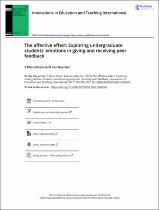| dc.contributor.author | Bharuthram, S | |
| dc.contributor.author | van Heerden, M | |
| dc.date.accessioned | 2023-07-18T10:21:23Z | |
| dc.date.available | 2023-07-18T10:21:23Z | |
| dc.date.issued | 2023 | |
| dc.identifier.citation | Bharuthram, S. and van Heerden, M., 2023. The affective effect: Exploring undergraduate students’ emotions in giving and receiving peer feedback. Innovations in Education and Teaching International, 60(3), pp.379-389. | en_US |
| dc.identifier.uri | https://doi.org/10.1080/14703297.2022.2040567 | |
| dc.identifier.uri | http://hdl.handle.net/10566/9210 | |
| dc.description.abstract | While the peer feedback process has an important role to play in student learning and has many benefits, it is not without its challenges. One of these is the effect that emotions may have on the way that students engage with the feedback. Yet, the specific emotions experienced during peer feedback is relatively under-explored. Therefore, this exploratory qualitative study unpacks the range of emotions experienced by students during peer feedback. Using Plutchnik’s Wheel of Emotions to analyze students’ questionnaire responses, the study found that students largely exhibited positive emotions, which may be due to their perceptions of themselves in relation to the process, as well as the various scaffolds put in place. Knowing which emotions students experienced during peer feedback may enable a greater understanding of the role of emotions in peer feedback, as well as enabling student feedback literacy development. | en_US |
| dc.language.iso | en | en_US |
| dc.publisher | Innovations in Education and Teaching International | en_US |
| dc.subject | Peer feedback | en_US |
| dc.subject | Emotions | en_US |
| dc.subject | Student feedback literacy | en_US |
| dc.subject | Undergraduate students | en_US |
| dc.subject | Academic literacies | en_US |
| dc.title | The affective effect: exploring undergraduate students’ emotions in giving and receiving peer feedback | en_US |
| dc.type | Article | en_US |

